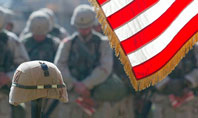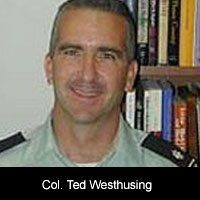- About Us
- Columns
- Letters
- Cartoons
- The Udder Limits
- Archives
- Ezy Reading Archive
- 2024 Cud Archives
- 2023 Cud Archives
- 2022 Cud Archives
- 2021 Cud Archives
- 2020 Cud Archives
- 2015-2019
- 2010-2014
- 2004-2009
 |
(Feb 2006) For God, Country and Profit? |

In June of 2005 the body of Colonel Theodore ‘Ted’ S. Westhusing, 44, was found in a military installation trailer in Baghdad, Iraq, the apparent victim of a self-inflicted single gunshot wound to the head. At the time he was the highest-ranking officer to die in the War.
While the death has prompted several commentaries and suggestions of conspiracy theories online and elsewhere regarding whether Westhusing’s death was indeed a suicide, the case raises several interesting observations about what the Colonel regarded as being ongoing instances of mismanagement, corruption and human rights abuse among the contractors under his control.
Journalist T. Christian Miller of the Los Angeles Times first brought the story to real national attention late last year, and as he indicated in an interview with National Public Radio’s All Things Considered on November 28th, 2005, the story of Westhusing’s death is as much one of personal tragedy as of an insight into the changing face of war currently conducted by the United States in Iraq.
Westhusing’s credentials as an officer were impeccable. As well as considerable operations and administrative experience within the Army, he held a doctorate in philosophy and was an instructor at West Point in English, philosophy and, most importantly given what he would later claim to have encountered in Iraq, ethics.
Westhusing volunteered to go to the war in the autumn of 2004, feeling, as Miller outlined, that it would help better serve the teaching of his cadets, and he took over the administration of an aspect of the United States’ ongoing training of the Iraqi security forces. More specifically, he was in charge of the oversight of a large American security company, USIS of Virginia, who had been contracted to carry out the actual training.
Though it appears that Westhusing’s superiors were very pleased with his progress, last May he received an anonymous four-page letter outlining allegations of wrongdoing by USIS. In his article, Miller details that the letter cited two particular areas of concern. First, that USIS had been short-changing the American government on the costs of training so as to increase profits. Second, and more alarmingly, the letter’s author claimed that human rights violations involving USIS had taken place on at least two occasions. In total violation of the rules regarding the involvement of private contractors in combat, it was reported that an individual within USIS had engaged in offensive operations during the campaign on Fallujah in November of 2004 and boasted about the number of insurgents he had killed. Later, the letter asserted that another USIS contractor had witnessed Iraqi police trainees kill two innocent Iraqi civilians and assisted in covering up their deaths so as to protect USIS interests in the country from scrutiny.
 The letter had a huge impact on Westhusing, who felt he shared a direct responsibility in the blame for such activity having taken place under his command. Westhusing immediately reported the letter to his supervisors and confronted the USIS contractors with his allegations, demanding an answer, and yet while it appears that the FBI and Inspector General of Iraq are still examining the matter, the U.S Army has, after investigation, largely cleared the contractors of any culpability.
The letter had a huge impact on Westhusing, who felt he shared a direct responsibility in the blame for such activity having taken place under his command. Westhusing immediately reported the letter to his supervisors and confronted the USIS contractors with his allegations, demanding an answer, and yet while it appears that the FBI and Inspector General of Iraq are still examining the matter, the U.S Army has, after investigation, largely cleared the contractors of any culpability.
Three weeks after discovering the letter, Westhusing was found dead with a suicide note and his weapon beside him in the military installation that is home to USIS’s central base of operations in Baghdad. In his suicide note, Westhusing expressed anguish with the mission he had gone to undertake in Iraq, and that the degree and extent of corruption he had discovered was totally removed from the reasons why he had volunteered for the war. Miller writes that in Westhusing’s note he explained, “I am sullied… I came to serve honourably and feel dishonoured. Death before being dishonoured any more…”
Westhusing is reported by family and colleagues to have become increasingly distressed and agitated in the period after receiving the letter, losing weight and becoming more and more withdrawn that would be in keeping with an individual’s lapse into deep depression. Still, given the fact he was a devout Catholic, so schooled in matters of ethics, and also had experience in dealing with the issue of post-traumatic stress, some believe this may have been more than just a suicide. And yet, a three-month investigation by the military concluded that given the increased strain in his work environment, the fact his handwriting matched that on the suicide note, and that gunpowder residue was found on his hand, that Westhusing had taken his own life.
 Irrespective, Miller makes a compelling case for the fact that what most certainly killed the spirit in Westhusing, if not the man itself, was his inability to reconcile the fact that he felt profit had well overtaken the duties of honour and country that, no matter how idealistic, he felt were the core reasons that America traditionally went to war. Rather, in Westhusing’s view, wars for his beloved country had now become outsourced undertakings that were subject to the perverted motivations of money and money alone for increasingly greedy contractors. The LA Times reported that a military psychologist reviewing Westhusing’s letters and emails came to the assessment that it was a ‘flaw’ he couldn’t come to accept that doing the right thing might not be the only motivating factor for the private sector and able to be accepted and incorporated within the overall military goal of completing a given mission.
Irrespective, Miller makes a compelling case for the fact that what most certainly killed the spirit in Westhusing, if not the man itself, was his inability to reconcile the fact that he felt profit had well overtaken the duties of honour and country that, no matter how idealistic, he felt were the core reasons that America traditionally went to war. Rather, in Westhusing’s view, wars for his beloved country had now become outsourced undertakings that were subject to the perverted motivations of money and money alone for increasingly greedy contractors. The LA Times reported that a military psychologist reviewing Westhusing’s letters and emails came to the assessment that it was a ‘flaw’ he couldn’t come to accept that doing the right thing might not be the only motivating factor for the private sector and able to be accepted and incorporated within the overall military goal of completing a given mission.
Even in an undertaking that is so overwhelmingly free from difficulties and convenient black and white considerations as war, it is no doubt regrettable that ethics and moral responsibility can be dismissed so easily as the stuff of mental disorders. This not only dishonours the memory of Colonel Ted. S Westhusing, but highlights the obvious absence of men of such character in the administration of this conflict.
Source:
T. Christian Miller, A Journey That Ended in Anguish, LA Times, November 27, 2005.
Please see also:
http://www.npr.org/templates/story/story.php?storyId=5029893
http://www.jamaica-gleaner.com/gleaner/20051201/cleisure/cleisure3.html
